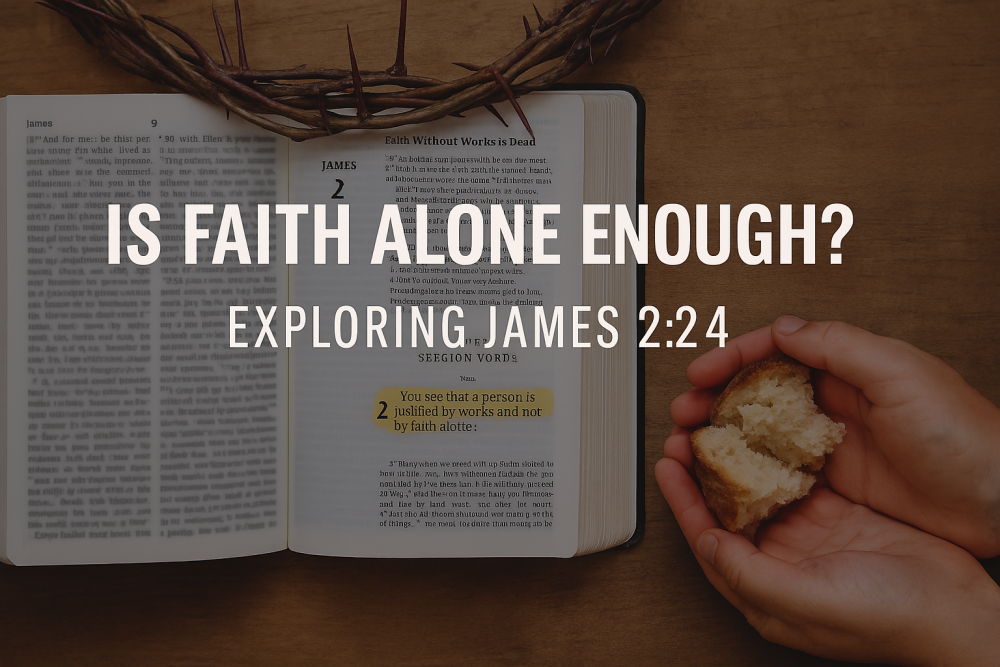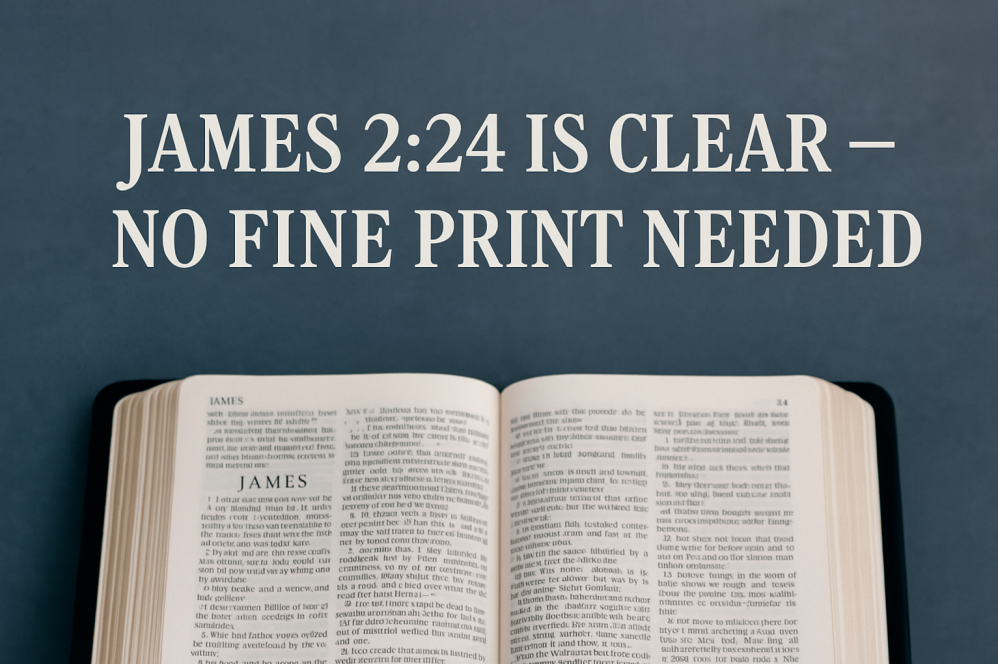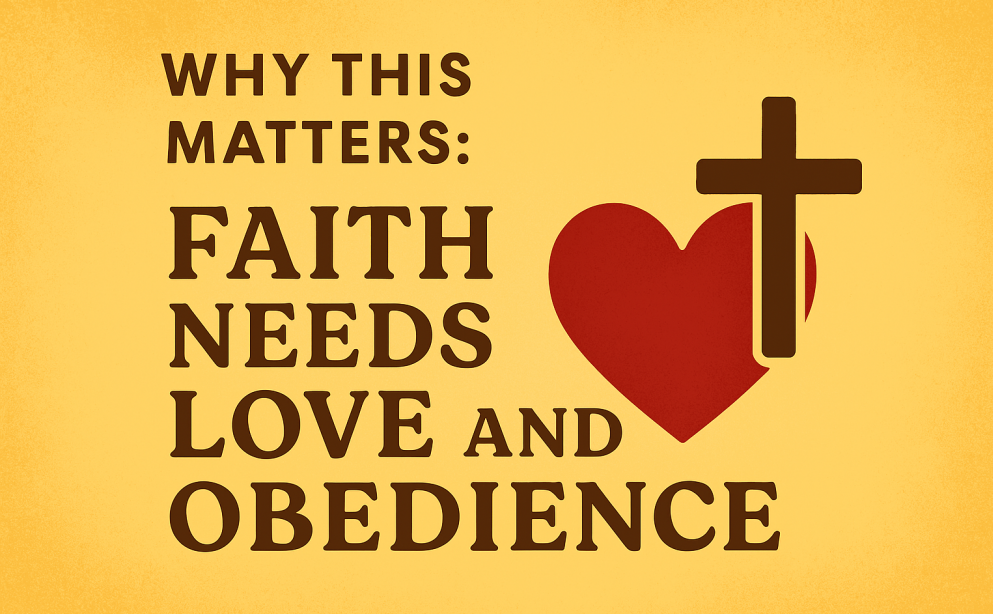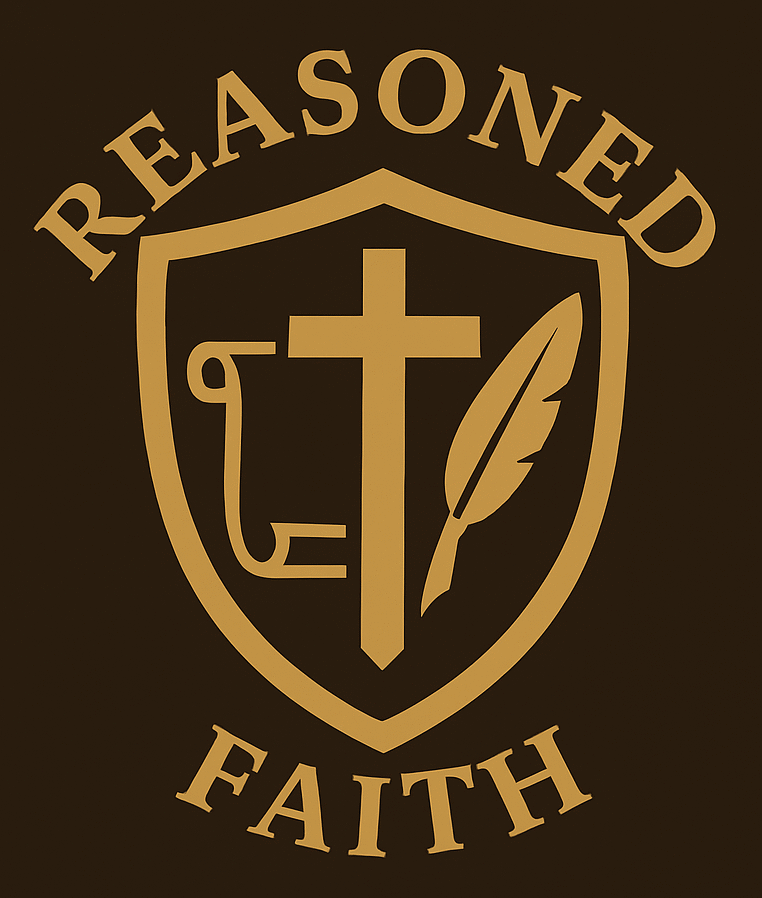
At the heart of Protestant theology is the claim that we’re saved by faith alone. But there’s one Bible verse that directly challenges that idea — and it comes from James.
In James 2:24, we read:
“You see that a person is justified by works and not by faith alone.”
That verse is a major problem for the “faith alone” crowd. It’s actually the only time the phrase “faith alone” appears in the Bible — and it’s used to reject the idea.
So what do some Protestant teachers do? They try to explain it away. Some say James is only talking about “said faith” (faith that’s just claimed but not real). Others argue that James means we are vindicated before men, not God. And some claim that James is only saying works demonstrate our faith, but don’t contribute to salvation.
Let’s take a closer look at these claims — and why they fall apart under honest reading.

James 2:24 Is Clear — No Fine Print Needed
Let’s begin with what James actually says:
“A person is justified by works and not by faith alone.” (James 2:24)
James doesn’t say:
- “a person appears to be justified…”
- “a person proves their faith to others…”
- or “a person is justified before men…”
He says plainly: is justified by works — and not by faith alone.
This isn’t about putting on a show. It’s about what actually justifies someone.

1. Is James Just Talking About “Said Faith”?
Some Protestants claim James is only talking about someone who says they have faith — but doesn’t really.
But James never says it’s fake faith. He simply says that faith without works is dead.
“Faith by itself, if it does not have works, is dead.” (James 2:17)
It’s not imaginary faith. It’s real faith — just dead, inactive, useless.
Dead faith is still faith, not an illusion. It just isn’t enough on its own.

2. “Justified Before Men”? Doesn’t Fit
Others argue James means we’re justified in the eyes of people, not God.
But the text doesn’t say “before men.” That idea is read into the passage to avoid its natural meaning.
Let’s test this with James’s examples:
Abraham
When Abraham offered Isaac, who was watching? No crowd. Just Abraham, Isaac, and God. So if Abraham was “justified” in that moment, it wasn’t to impress others.
Rahab
Rahab hid two spies and lied to protect them. That wasn’t a public act. Yet James says her works justified her.
Neither example supports the idea of being “vindicated before men.”

3. “Works Just Show Our Faith”?
Some try to say James is just teaching that works demonstrate we have faith.
Sure, works do reflect faith. But James goes way beyond that. He writes:
“You see that faith was active along with his works, and faith was completed by his works.” (James 2:22)
“Do you want to be shown, you foolish person, that faith apart from works is useless?” (James 2:20)
This isn’t just about putting your faith on display. It’s about completing it.

Why This Matters: Faith Needs Love and Obedience
We’re not saved by works alone, and we’re not saved by faith alone either.
St. Paul agrees with James when he writes:
“For in Christ Jesus neither circumcision nor uncircumcision counts for anything, but only faith working through love.” (Galatians 5:6)
Without love, even the greatest deeds mean nothing (1 Corinthians 13).
Even faith that can move mountains is worthless without love.
This tells us that obedient love, shown through our works, is what makes faith alive.

Real Faith Is Made Complete by Works
James says:
“You see that a person is justified by works and not by faith alone.” (James 2:24)
Protestant interpretations try to water that down. But if we let the text speak for itself, the message is loud and clear:
Faith without works is dead.
Works alone can’t save us.
But faith with works — faith completed by obedience and love — is the kind that saves.
A Word to Our Protestant Friends
If you’re Protestant, this might challenge what you’ve always been taught. But don’t just take our word for it — read James 2 for yourself, slowly and honestly.
And ask: Why are we trying to make the Bible say something it doesn’t?
The Catholic Church has always taught that we are saved by grace, through faith, working through love — and that our good works, done in God’s grace, actually matter.
We’re not saved because of our works. But we’re also not saved without them.
Faith is the root. Works are the fruit. Both are needed for a living, saving relationship with Jesus.
So let’s not try to cut off the branches. Let’s grow in both faith and good works, and follow the full truth of Scripture—just as James taught.
Internal Links Used:
- ✅ Faith And Works: How Sola Fide Misinterprets Key Bible Passages
- ✅ Faith Alone? Understanding Ephesians 2:8-9 And The Role Of Works In Salvation

This is a well-written and thought-provoking article! James 2 is an important passage that all Christians should wrestle with seriously.
As a Protestant, I fully agree that faith without works is dead. Genuine faith produces good works as a natural outgrowth of a transformed heart (Ephesians 2:10). However, I believe there is a distinction between justification before God and the evidence of that justification in our lives.
Paul clearly teaches that we are justified by faith apart from works of the law (Romans 3:28, Ephesians 2:8-9). If James is contradicting that, then Scripture would be in conflict with itself. But could it be that James is speaking about a different aspect of justification—one that pertains to the visible demonstration of our faith?
For example, when James speaks of Abraham being “justified by works” (James 2:21), we know from Genesis 15:6 that Abraham was already declared righteous by faith long before he offered Isaac in Genesis 22. So could James be emphasizing how Abraham’s faith was shown to be genuine through his obedience, rather than suggesting his works contributed to his initial justification before God?
Furthermore, when James says, “faith was completed by his works” (James 2:22), does this mean faith itself was insufficient, or rather that genuine faith naturally results in good works?
I appreciate the emphasis on faith working through love (Galatians 5:6), and I agree that a faith that does not produce love and obedience is not true faith at all. But I’d love to hear your thoughts on how we reconcile James with Paul’s clear teaching that we are justified by faith apart from works (Romans 4:5).
Looking forward to a great discussion! God bless.
Thanks for your thoughtful comment—there’s a lot we actually agree on. Catholics fully affirm that genuine faith produces good works, and that these works serve as the visible fruit of a transformed heart. Where we differ is not on whether works matter, but how they relate to justification. Paul says we are justified “apart from works of the law” (Romans 3:28), referring specifically to Mosaic observances—not to acts of love, mercy, or obedience done through grace. James, on the other hand, addresses how our faith is made complete and shown to be real—through those very good works (James 2:22, 26).
Abraham’s example helps clarify this. Paul highlights Genesis 15, where Abraham believed and was declared righteous. James, however, points to Genesis 22, when Abraham offered Isaac. Interestingly, Hebrews 11 also points to Genesis 12—when Abraham obeyed God and left his homeland—as an act of justifying faith. Rather than contradicting, these instances reveal that justification isn’t just a one-time event but a journey: Abraham’s faith grew and was deepened through each act of obedience. The Catholic Church understands justification as both a process and a one-time event. It is a complex reality that has both a beginning and a continuing aspect. Catholic teaching sees these as multiple moments of increasing justification—God’s grace at work, and Abraham freely cooperating with it.
When James says faith was “completed by his works,” he isn’t implying faith is insufficient. He’s saying that real faith is living—it responds, it acts, it grows. This doesn’t contradict Paul’s message, because Paul himself taught that “faith working through love” is what ultimately counts (Galatians 5:6). So while faith initiates our relationship with God, works perfect and sustain it, as we cooperate with the Holy Spirit.
In short, Catholic teaching sees justification as both a gift and a process. It begins with grace, but we must respond with faith and love. Good works don’t replace faith—they prove it, shape it, and perfect it as we walk with God.
I hope this helps
The distinction you draw between justification before God and justification before men is fascinating and raises a crucial theological tension, especially in light of James 2:24. If faith truly leads to transformative works, does the absence of visible fruit indicate a lack of saving faith, or could it reflect spiritual immaturity? I’m curious how you interpret instances where someone professes belief but consistently shows no outward transformation. Would you say such a person was never justified before God to begin with, or is there a category of genuine believers who remain largely unfruitful yet still saved? This seems especially relevant in pastoral contexts where assurance and exhortation must be balanced.
Great question. From a Catholic view, justification isn’t just a legal label — it’s a real change in the soul through grace. When someone truly believes, we expect to see transformation over time because faith, to be alive, must work through love (Gal 5:6).
James 2:24 is clear: “a person is justified by works and not by faith alone.” That means if someone consistently shows no visible change — no love, no obedience — it may point to one of two things: either they were never truly justified to begin with, or they’ve fallen out of grace through serious sin.
That said, spiritual growth can be slow, and immaturity doesn’t mean someone isn’t saved. But justification isn’t a one-and-done moment — it’s ongoing. We must continue cooperating with grace through love and good works to remain in Christ, just as Jesus said, “Abide in me… Every branch in me that does not bear fruit he takes away” (John 15:4–6).
So yes, pastoral care requires balance — assurance that God is patient, but also encouragement that living faith must bear fruit.